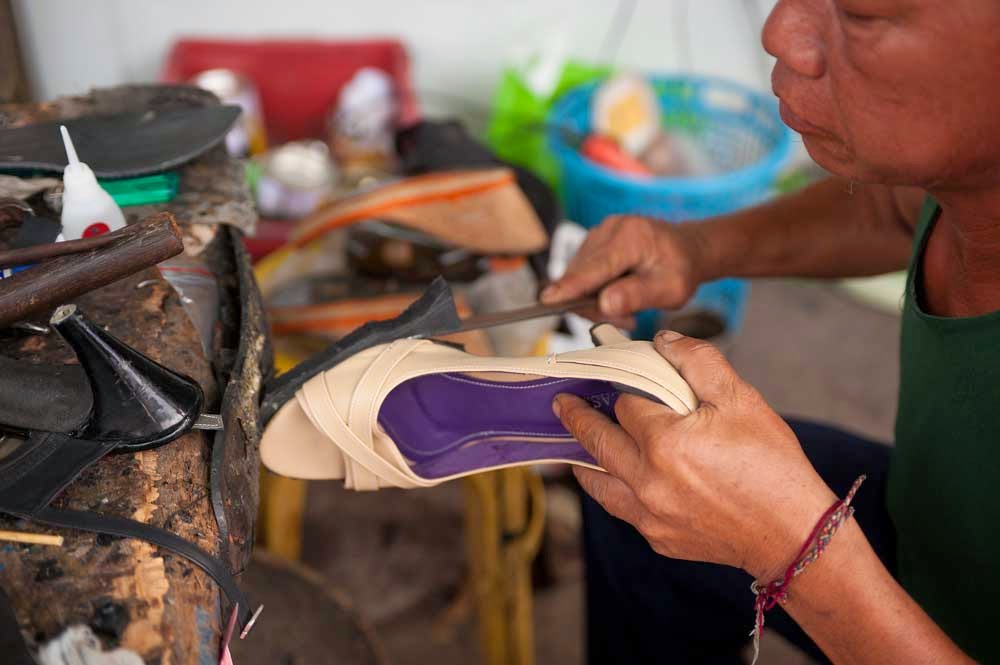Sidewalk cobbler - no, this blog is not about some variant of fruit desserts. This blog is about the trade of repairing shoes. Cobblers are people who earn their living by repairing shoes and other traditional leather goods.
After two years and many journeys not to mention always carrying at least 10 Kg (22 pounds) of gear, the strap on one of my camera bags was just about sheared through. I thought that Duang could fix it but she said her sewing machines were not powerful enough. I then suggested that we take it to someone who fixes shoes.
On Wednesday on one of her forays into downtown Udonthani, Duang brought my bag with her in search of a shoe repair shop. She returned home without the bag and said that it would be ready at 2:00 P.M.
Getting things done around here is always interesting and often a challenge. There are no telephone books here or anything resembling the "Yellow Pages". To the best of my knowledge, Udonthani does not have a newspaper - not that it would matter - even Bangkok newspapers do not have a classified section with info on available local services.
Here in Udon there are two ways of finding out about getting things done. The first way is to check on the local expat website, www.udonmap.com, to see if some one has asked before and received a reply or to ask about the service you now need. The second method is to ask people - family and friends if they know who, what and where or even do they know someone who knows who, what and where. That is how it works here and it does work - especially if your spouse is trilingual!
 |
| Curbside Cobbler in Downtown Udonthani |
We drove into the city in the afternoon and found the cobbler quite easily. The cobbler was set upon the sidewalk of Udon Dutsadi Rd just before the entrance to the Prachum Wittaya School. Just like many of the "restaurants" here, the cobbler operates on the sidewalk. After hours, she packs up shop literally and figuratively into a well worn and abused wood box which she locks and chains to a fence. I have many food carts utilized the same way - chained on location, and set up on the sidewalk when in operation. With food carts, plastic tables and chairs are set up on the sidewalk around the food cart to provide the ultimate alfresco dining experience.
 |
| Hand Stitching My Back Pack |
When we arrived at the curbside cobbler, I knew that Duang had found a good one. The woman had several school book bags that she was repairing in addition to several handbags. The top of her work station had several pairs of combat boots. We have a couple military bases in town and several types of police that wear combat boots. Their selection of her to maintain their gear was a good recommendation.
It was interesting to watch the woman and her brother work. Cord for sewing leather and ballistic cloth together was wrapped around a tin can. Spare parts and accessories were stores in a large plastic jar. Sheets of sole material and leather were kept in a plastic laundry basket.
 |
| Trimming the Soles |
His sister manually sewed the shoulder strap to my backpack. The only electrical device that the cobblers had was a small electric hand drill that the brother had used to install a set of honor guard horseshoe heel taps and cheater bars on a policeman's shoes while he waited. Besides curbside service, the cobblers also provided walkup and work while you wait service. It was quite interesting to observe.
 |
I have always been interested in learning and seeing how things are made or done. Here in Southeast Asia there are plenty of opportunities to observe and learn. Many of the opportunities are well out in public view with the workers more than willing to explain and demonstrate their craft.
I was also brought up to not waste things. There have been many times when I have had to throw out good items such as electronics because it was cheaper to replace them than to repair them. That has always bothered me for I consider it to be wasteful as well as illogical. Here in Southeast Asia, you can repair items and have them repaired quite economically. Having things repaired appeals to my frugality and ... to my sense of humanity. When items are repaired locally, you are directly helping the local economy and no doubt helping to support a local family. More often than not, when you purchase new you are supporting an international manufacturer outside of your country.
One of my philosophies that I sometimes espouse in this blog is "local solutions for local situations". Having items repaired is an action that supports the local solution philosophy. Now, if it were only easier to find that solution here ...






No comments:
Post a Comment